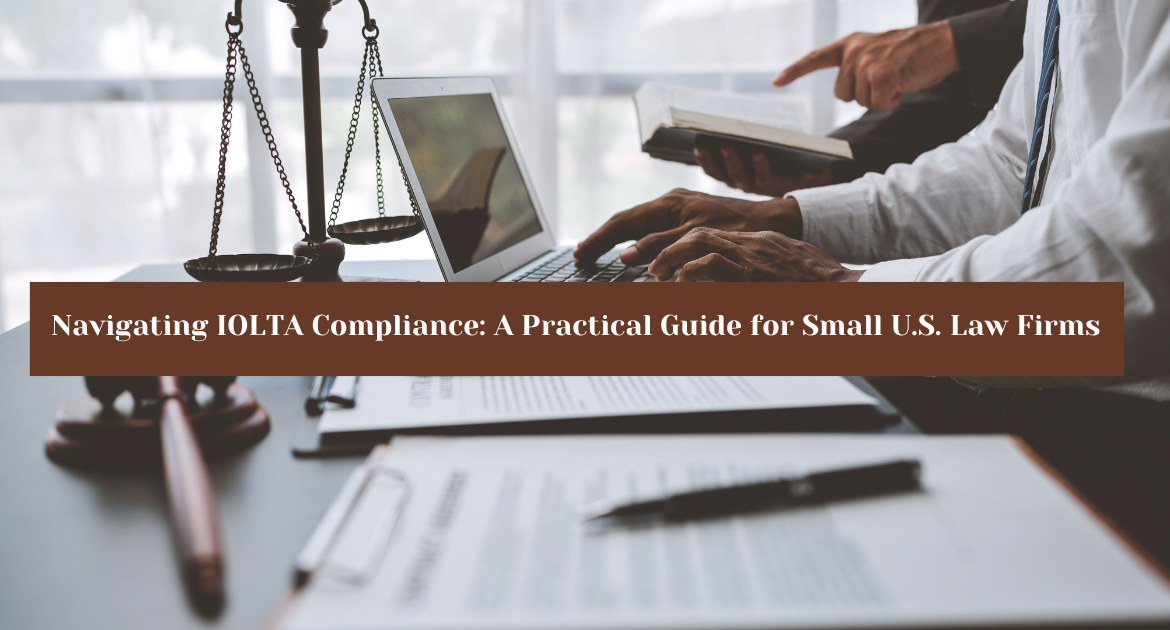Among the legal ethics which small law firms in the United States should follow, there is compliance with Interest on Lawyers’ Trust Accounts. IOLTA programs guarantee that in case clients’ money is left in a lawyer’s hands, it is always safe and serviced in case such needs arise for it to be done for common good benefits. These are all, however, nuanced requirements and can be particularly overwhelming for those practices already at a premium. The following guide lays out some very actionable steps in simplifying how the small U.S. law firm can best comply with IOLTA.
What is IOLTA?
In most of the U.S. jurisdictions, IOLTA is a program in which attorneys are obliged to place nominal or short-term client funds into special interest-bearing trust accounts. Interest earned from the accounts is pooled and disbursed for funding of legal aid and public interest programs.
Sometimes small law firms are obliged to take customer’s money in trust such as retainers, settlement monies, court fees etc. These should be kept away from the firm’s current accounts in a way so as to avoid commingling and disclosure. The very foundation for compliance revolved around knowing the regulations and best practices regarding the IOLTA accounts and would go a long way towards making sure the confidence between the clients and the regulatory authorities does not wear off.
Requirements for Key Compliance of IOLTA Accounts
Rule Keeping Client Funds Separate from Firm Funds
- Never commingling any client funds with the operating accounts of your firm. All client deposits are to be deposited into a trust account that is kept separate.
- Run an accounting software program OR keep a separate manual ledger in the accounting of each client’s funds placed in the IOLTA account.
Select an Approved Financial Institution
- IOLTA accounts are to be established only in those banks and other financial institutions which have been approved for this purpose by the IOLTA program in your state.
- The approved institutions should also meet other criteria including paying comparably attractive interest rates and not charging fees against client funds that will deplete such funds.
Deposit and Withdrawals -Exercise Due Care
- Place in an IOLTA account only those funds of clients that are nominal in amount or briefly held.
- Record all withdrawals and support those withdrawals with appropriate invoices or instructions of disbursement.
Records and Accounting Sufficient
- Record deposits, withdrawals, and interest earned accurately
- Retain such records as long as your state bar association requires, usually from five to seven years.
Know Your State’s Rule
- Each state is unique as to rules and regulations in IOLTA requirements of reporting and remittance.
- Read the rules as published by your state bar association or IOLTA program.
Common Mistakes and How to Avoid Them
Commingling Funds
Mistake: Placing client funds into a firm account, or vice-versa.
Solution: Keep property and funds of each client as a whole separate, irrespective of the insignificance the sum may be. Keep accounting on a trust accounting system as specifically designed for a legal practice.
Failure to Account Monthly Reconciliations
Pitfall: Failure to reconcile on a timely a month-to-month basis will incur errors and or omissions.
Solution: Reconcile your IOLTA accounts month to month, making sure all of the account balances agree with your books and records. Regular audits can head off costly mistakes, too.
Use of Non-Approved Banks
Pitfall: Opening an IOLTA account with a bank not approved by your state.
Solution: Check your bank’s IOLTA program status with your state before opening any account. Most state bar associations publish a list of participating institutions.
Best Practices to Streamline IOLTA Administration
Utilize Technology
- Utilize an integrated legal practice management software package with trust accounting. The package should be in a position of automating your record keeping, reporting, and due dates of compliance.
Train Your Staff
- Engage in training all your staff who may be dealing with client funds in matters relating to IOLTA rules and procedures.
- Provide continuing legal education. Create an IOLTA compliance policy manual.
Hire a Professional Accountant
- Contract with a service that employs a qualified CPA or other qualified bookkeeper with substantial attorney trust accounting experience to perform the monthly reconciliations and most of the financial reporting.
Stay Current with the Rules
- Get the very latest rule changes with respect to reporting from the state IOLTA program or bar association.
Develop a Checklist
The need for formulating a checklist that describes how a firm is in compliance in handling the trust accounts-in exhaustive detail and item by item. This would include reconciliation procedures on a month-by-month basis, yearly reporting, as well as procedures for employee training.
Benefits of IOLTA Compliances
Though IOLTA may be at times a pain in one’s neck, good practices regarding IOLTA bear their advantages:
- Confident clients mean good taking care of the clients, integrity and professionalism; this sets a very good name for your firm.
- Compliance will reduce the chances of there being disciplinary or malpractice action arising out of the mismanaged funds.
- By compliance the firm would be indirectly contributing to assurance of access to justice, assurance of public interest by virtue of the IOLTA program.
Conclusion
IOLTA compliance is one of those necessary evils nobody really envies, but it really need not be daunting if one knows his way around it: know what requirements are in place, beware of common mistakes, install best practices, and keep the firm compliant-together legally and ethically with every expectation of the clients and contribute to the larger community of attorneys.
After all, it is those good practices that relate to the management of IOLTA accounts, which concern investing time in this area. Again, it secures not only the firm but those ideals of justice and fairness that are cornerstones of a legal profession.






